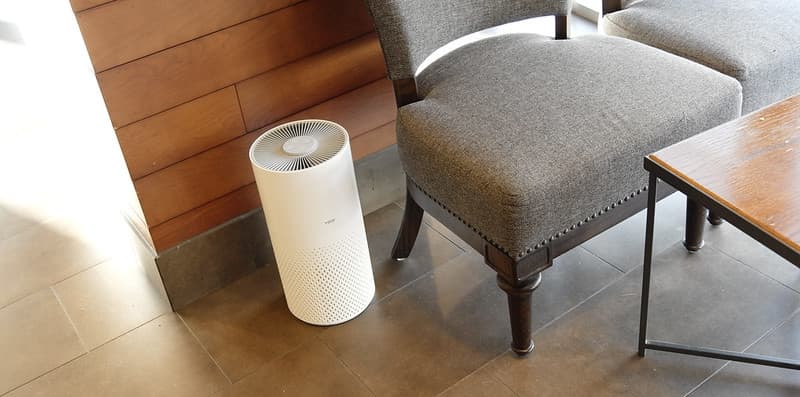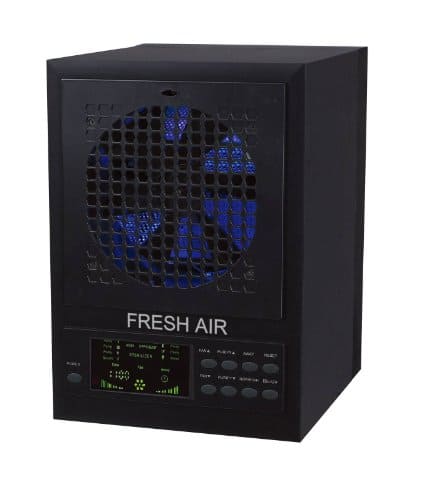Are you thinking of getting an air purifier? You may be wondering if it’s worth the investment.
In this article, we’ll look at some of the benefits of owning an air purifier and help you decide if it’s the right choice for you.
So, is it worth getting an air purifier?
Let’s begin,
What is an air purifier, and what does it do?
Air purifiers are devices that help improve the air quality in your home. They work by trapping harmful particles like dust, pollen, and smoke, and they can also help eliminate unpleasant odors.
Some air purifiers even use ultraviolet light to kill bacteria and viruses. While they can be helpful for people with allergies or respiratory problems, air purifiers are also great for anyone who wants to breathe cleaner, healthier air.
When shopping for an air purifier, it is important to consider the size of the unit and the specific needs of your home.
Some units are designed for larger spaces, while others are better suited for small rooms or offices.
Air purifiers are also specifically designed to target certain types of pollutants, so it is important to choose a unit that will work best for your particular needs.
The benefits of owning an air purifier
Assuming you don’t already own an air purifier, you might be wondering if they’re worth the investment.
After all, isn’t the air outside usually more polluted than the air inside your home? While it’s true that indoor air pollutants are often less concentrated than outdoor pollutants, there are still several reasons to invest in an air purifier.
People spend most of their time indoors, so it’s important to make sure the air inside your home is as clean as possible.
Additionally, many common household items like carpets and upholstered furniture can emit pollutants, and an air purifier can help remove these contaminants from the air.
Air purifiers work by trapping airborne particles, such as dust, pollen, and pet dander and removing them from the air.
Finally, an air purifier can make a big difference in the quality of life for people with allergies or asthma.
By removing allergens and other irritants from the air, an air purifier can help people with breathing problems to breathe easier and enjoy a better quality of life.
How to decide if an air purifier is right for you?
Air purifiers are becoming an increasingly popular choice for people looking to improve the air quality in their homes.
But with so many different types and models on the market, it can be not easy to know which one is right for you. Here are a few things to keep in mind when making your decision:
First, consider the size of the room you need to purify. Air purifiers come in all different sizes, and you’ll want to make sure you choose one that’s powerful enough to clean the air in your desired space.
Second, take into account your specific needs. If you suffer from allergies or asthma, you’ll want to look for an air purifier specifically designed to remove pollen, dust, and other allergens from the air.
Finally, think about your budget. Before buying an air purifier, you should keep in mind your budget. They come at different prices.
By considering these factors, you’ll be able to narrow down your options and choose the air purifier that’s right for you.
The different types of air purifiers
When it comes to improving the air quality in your home, there are several different options to choose from.
The most popular type of air purifier is the HEPA filter, which is highly effective at removing airborne particles such as dust, pollen, and pet dander.

Activated carbon filters are also popular, as they can remove harmful gases and odors from the air.
If you have allergies or asthma, you may want to consider an ionizer, which emits charged particles that can help to reduce the presence of allergens in the air.
Here is a list of different are purifiers:
Console Air Purifiers
Many people are familiar with air purifiers that are designed to improve the quality of indoor air. However, there is a newer type of air purifier on the market designed for use in automobiles.
These devices, known as console air purifiers, are small units that can be easily installed in the console area of a car or truck.
Console air purifiers work by drawing in outside air and passing it through filters. This process removes dust, pollen, and smoke from the air, providing drivers with cleaner, healthier air to breathe.
In addition, console air purifiers can also help reduce odors inside the vehicle. As more and more people become aware of the benefits of these devices, their popularity will likely continue to grow.
Whole House Air Purifiers
Whole-house air purifiers are designed to clean the air in your entire home, not just one room. They work by pulling air in from your ductwork and passing it through a filter to remove contaminants.
Some whole-house air purifiers also use UV light to kill bacteria and viruses. Whole-house air purifiers can be more effective than portable units since they can even treat all the air in your home.
This is especially important if you have allergies or asthma because it can help to reduce your symptoms by removing triggers from the air.
Portable Air Purifiers
Portable air purifiers are small, lightweight devices that can be moved from room to room.
They work by drawing in polluted air and passing it through a filter, which traps harmful particles such as dust, pollen, and smoke.
Portable air purifiers can effectively improve indoor air quality, especially in homes with pets or smokers.
Some units also feature activated carbon filters, which can help remove odors from the air.
Carbon Filters
A carbon filter air purifier is a device that uses activated carbon to remove contaminants from the air.
The activated carbon adsorption process is very effective at removing a wide range of airborne pollutants, including smoke, dust, pollen, and pet dander.
Additionally, carbon filters are often used in conjunction with other filters, such as HEPA filters, to provide an even higher level of air filtration.
Carbon filters are available in various sizes and styles to suit any needs, and they are an excellent choice for those who suffer from allergies or other respiratory conditions.
Electrostatic Precipitators
Electrostatic Precipitators (ESPs) are devices that remove dust particles from a flowing gas using the principle of electrostatic precipitation.
A high voltage electrical field is used to charge the dust particles passing through the device.
The charged particles are then attracted to oppositely charged collector plates, where they are then removed from the gas stream.
ESPs are highly effective at removing very fine particles from gases and are commonly used in power plants to remove harmful emissions from coal-fired power plants.
UVGI Photocatalytic oxidation
Ultraviolet germicidal irradiation (UVGI) is a disinfection method that uses short-wavelength ultraviolet (UV-C) light to kill or inactivate microorganisms by destroying nucleic acids and disrupting their DNA, leaving them unable to perform vital cellular functions.
UVGI is used in various applications, including air, water, and surface disinfection. One type of UVGI air purifier is the photocatalytic oxidation (PCO) air purifier.
PCO air purifiers use a combination of UV light and a catalyst, such as titanium dioxide, to create a chemical reaction that produces ozone and other oxidizing agents.
These oxidizing agents break down VOCs (volatile organic compounds), bacteria, mold, and other airborne contaminants into harmless byproducts, like carbon dioxide and water vapor.
PCO air purifiers effectively reduce or eliminate many common indoor air pollutants, including viruses, bacteria, mold spores, dust mite allergens, VOCs from paints and cleaning products, smoke particles, and odors.
Ozone generators
Ozone generators are air purifiers that use ozone to clean the air. Ozone is a form of oxygen that has three atoms instead of two.
It is found in the upper atmosphere and is used to break down pollution. When ozone is released into the air, it reacts with other chemicals to form new, less harmful compounds to the environment.

Ozone generators can remove odors, smoke, and other pollutants from the air. They are often used in industrial settings, but they can also be used in homes and office buildings.
Ozone generators have their risks. High levels of ozone can be harmful to human health, so it is important to use them cautiously.
FAQ
What are the benefits of having an air purifier?
The benefits of having an air purifier are that it can improve the air quality in your home, and it can help reduce allergies and asthma symptoms. An air purifier can also help remove toxins and pollutants from the air, which can be helpful for people who suffer from respiratory problems.
Can an air purifier help with allergies?
Yes, an air purifier can help to reduce allergies and asthma symptoms. The air purifier can remove allergens and pollutants from the air, which can help to improve the quality of the air in your home.
How much does an air purifier cost?
The cost of an air purifier depends on the type of purifier you choose. There are many different air purifiers on the market, and the price can range from a few hundred dollars to several thousand dollars.
Conclusion
So, is it worth getting an air purifier? In a word, yes. Air purifiers can provide a variety of benefits for your home and family.
They improve the quality of the air you breathe indoors, but they also help reduce allergies and asthma symptoms.
If you’re considering purchasing an air purifier, we hope this article has helped give you a better understanding of what to look for and how to decide if one is right for you.
Keep in mind that there are many different types of air purifiers on the market, so be sure to do your research before purchasing. Thanks for reading!